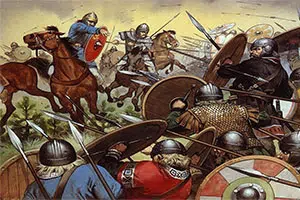 Anglosaxo is a medieval Latin word that came to Spanish as anglosaxon . The concept can be used to describe someone who speaks the English language or is originally from England .
Anglosaxo is a medieval Latin word that came to Spanish as anglosaxon . The concept can be used to describe someone who speaks the English language or is originally from England .
For example: “The members of the royal guard, with their tall hats, constitute one of the most famous Anglo-Saxon postcards worldwide” , “In my adolescence I listened to a lot of Anglo-Saxon rock, I liked bands like The Who and Pink Floyd” , “ The Anglo-Saxon writer was invited to participate in the next edition of the Buenos Aires International Book Fair .
The Germanic peoples who invaded English territory in the 5th century are also called Anglo-Saxons. The language spoken by those who were part of these cultures is also called Anglo-Saxon.
The ancient Anglo-Saxons, in this way, were the Germanic communities that advanced through the east and south of Britain between the beginning of the 5th century and 1066 , when the Norman conquest occurred. Their language , known as Anglo-Saxon or Old English , was imposed in England and regions of Scotland in that period.
These communities began their migration to Britain between the years 400 and 600, and they did so starting from Holland, southern Scandinavia and northern Germany. According to the Ecclesiastical History of the English People , written in Latin by the Northumbrian Benedictine monk known as Bede the Venerable , among the invaders were Jutes, Saxons and Angles. On the other hand, there are documents that also include the Franks and the Frisians.
It should be noted that there is another work in which the migration of these peoples is discussed, the so-called Anglo-Saxon Chronicle , a collection written in Old English that dates back to the 9th century and is estimated to have been created in the Kingdom of Wessex.
By the way, it is necessary to talk about the name Britannia , since in this way Great Britain was referred to before the Germanic invasions. The origin of this name is found in the time of the Roman Empire, since at that time the island was known as Britannia . In turn, we can say that it was the Greeks who named it in the first place, with two terms that can be translated as "island" and "tattoo", probably because of the striking tattoos that its inhabitants sported.
 In 597 the process of evangelization of the Anglo-Saxons began, which took approximately a century, since it is estimated that its completion date was the year 686. Throughout 600 and 700, the largest kingdoms were transferred to the can. Bede the Venerable mentions in his work Ethelbert , the king of Kent, a kingdom located southeast of the island , as the most predominant monarch in the second half of the 6th century; However, everything indicates that power was later disputed in the north, between the kingdoms of Northumbria and Mercia.
In 597 the process of evangelization of the Anglo-Saxons began, which took approximately a century, since it is estimated that its completion date was the year 686. Throughout 600 and 700, the largest kingdoms were transferred to the can. Bede the Venerable mentions in his work Ethelbert , the king of Kent, a kingdom located southeast of the island , as the most predominant monarch in the second half of the 6th century; However, everything indicates that power was later disputed in the north, between the kingdoms of Northumbria and Mercia.
Once the conquest was over, it is believed that many of the members of the Anglo-Saxon nobility were exiled, and others descended to the lower social class . It is believed that at the end of the 11th century, only 8 percent of the territory belonged to them. The destinations of most of the nobles were Scandinavia, Ireland and Scotland .
It is interesting to note, therefore, that the idea of Anglo-Saxon can refer both to a language that is no longer spoken or to current English. Depending on the context, the term can refer to one or the other.
The epic poem “Beowulf,” for example, is a famous literary work written in Anglo-Saxon (Old English). It has more than 3,000 verses and tells the epic of a hero who defeats terrible monsters and becomes king of the Geats.
